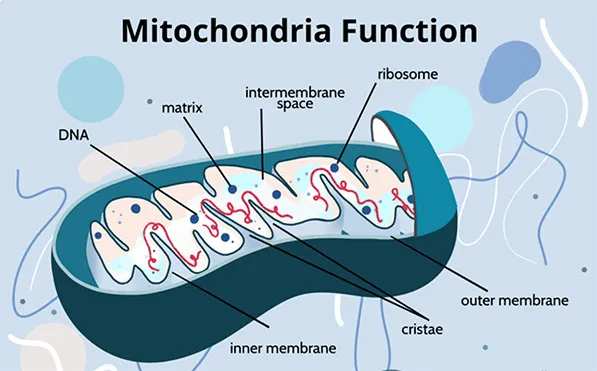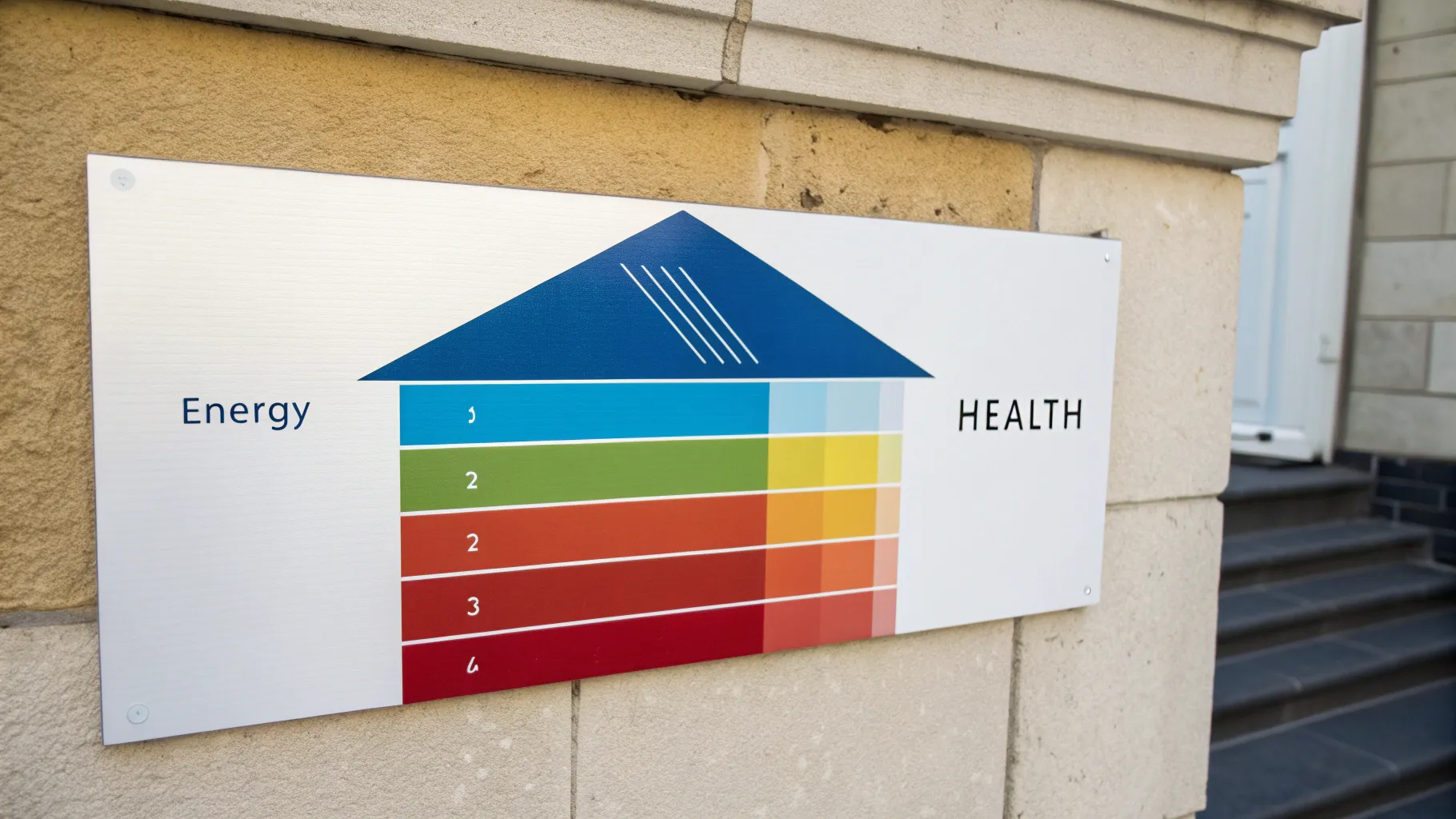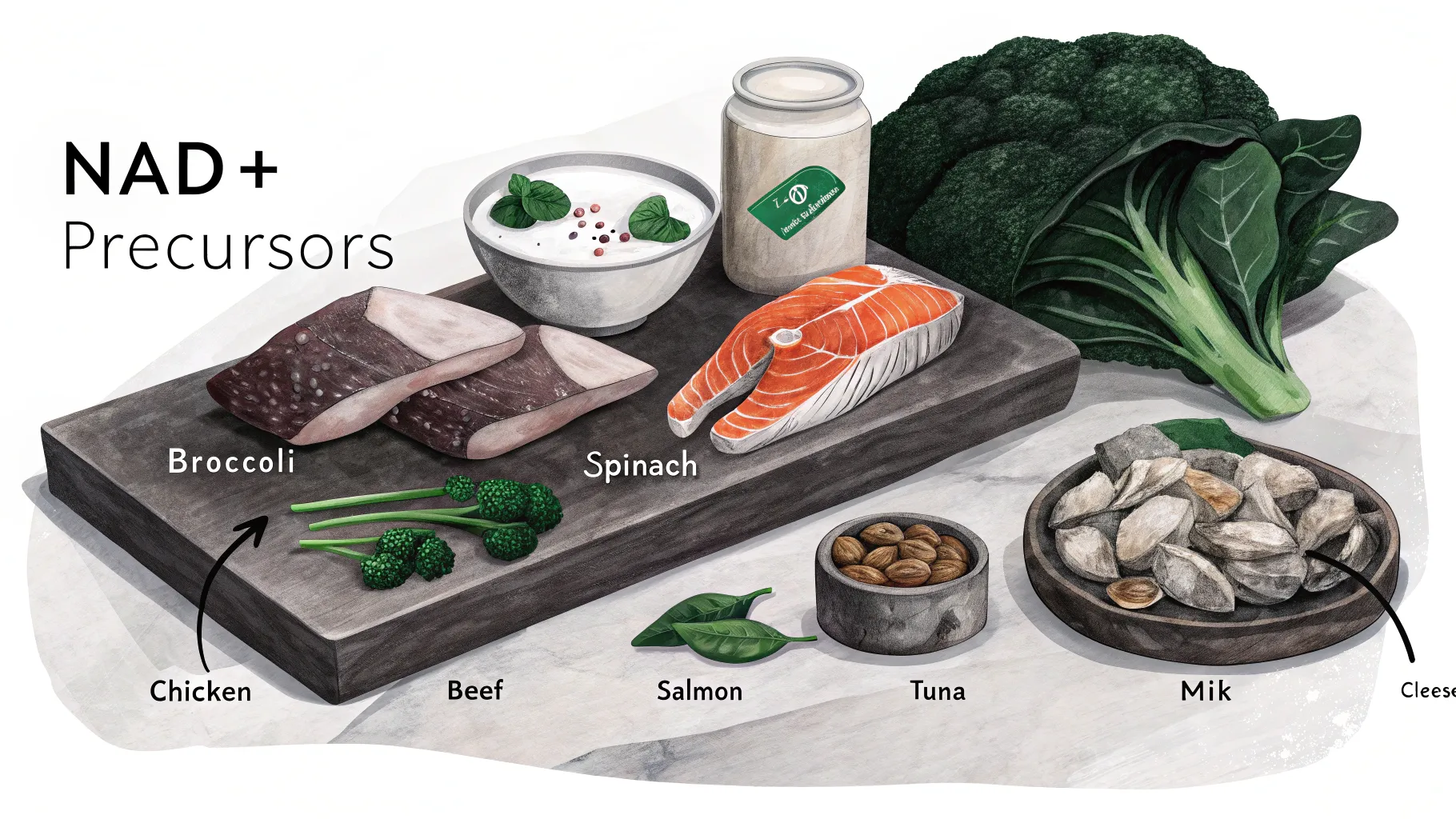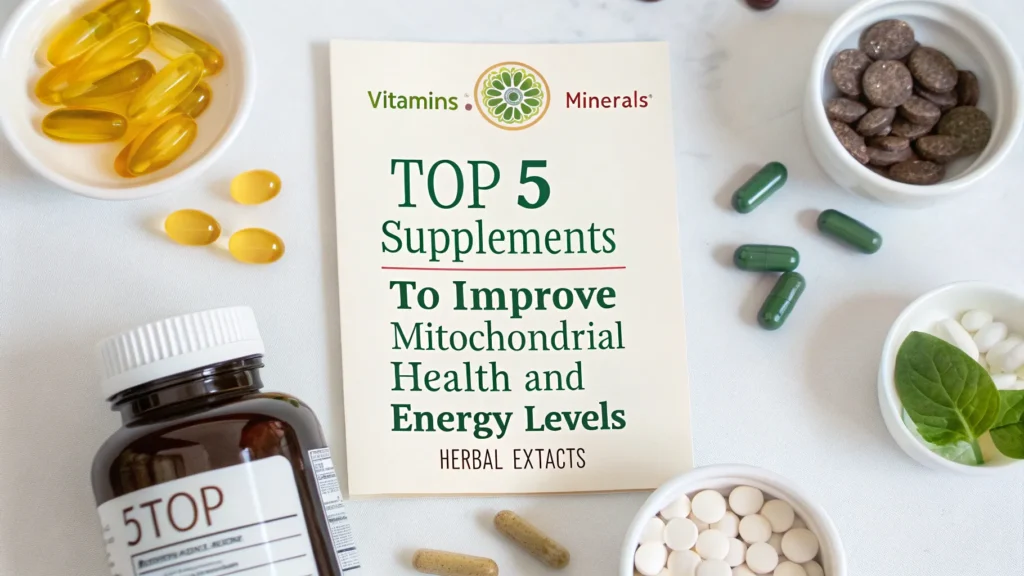Table of Contents
Introduction: Health Starts at the Cellular Level
Understanding Mitochondrial Health
Have you ever wondered why your energy levels aren’t what they used to be? The answer may lie deep within your cells, specifically in the mitochondria. These tiny organelles, often called the “powerhouses of the cell,” are responsible for producing the energy that powers nearly every function in your body. By supporting mitochondrial health, you can boost your energy, improve cellular function, and enhance overall vitality.

Importance of Energy Levels
Energy is fundamental to life. Every action, from breathing to thinking, depends on the energy produced by mitochondria in the form of adenosine triphosphate (ATP). ATP is generated through a highly efficient process called oxidative phosphorylation, which occurs in the inner membranes of mitochondria. This process involves the electron transport chain and the citric acid cycle (Krebs cycle), where nutrients like glucose and fatty acids are converted into usable energy.
Without healthy mitochondria, cells cannot produce sufficient ATP, leading to fatigue, reduced physical performance, and impaired bodily functions. For example:
- Muscle Activity: Mitochondria in muscle cells supply energy for movement and endurance.
- Brain Function: The brain relies on mitochondrial ATP for cognitive processes.
- Heart Health: The heart’s constant pumping requires a steady supply of mitochondrial energy.
When mitochondrial function declines due to aging or stress, it can result in insufficient energy production and even contribute to chronic diseases. Therefore, maintaining mitochondrial health is essential for sustaining high energy levels and overall well-being.
By understanding how mitochondria work and how to support them, you can take proactive steps toward feeling more vibrant and energetic every day.

Supplement #1: Coenzyme Q10 (CoQ10)
What is Coenzyme Q10?
Coenzyme Q10, commonly known as CoQ10, is a naturally occurring antioxidant found in the body, particularly in the mitochondria of cells. It plays a crucial role in the production of energy by facilitating the synthesis of adenosine triphosphate (ATP) through the electron transport chain. CoQ10 also helps protect cells from oxidative damage caused by free radicals, which can contribute to various health conditions and aging processes.
Benefits for Mitochondrial Health
CoQ10 offers several benefits specifically related to mitochondrial health:
| Benefit | Description |
|---|---|
| Energy Production | Supports ATP synthesis, ensuring efficient cellular energy generation. |
| Antioxidant Protection | Reduces oxidative stress and protects mitochondria from damage. |
| Mitochondrial Disorders | Improves symptoms of fatigue and muscle weakness in mitochondrial dysfunction. |
| Cardiovascular Health | Enhances heart function and reduces heart failure symptoms. |
| Neuroprotection | Protects brain cells and may slow neurodegenerative disease progression. |
Recommended Dosage and Sources
Dosage Guidelines
The recommended dosage of CoQ10 can vary based on individual health needs and conditions. However, general guidelines suggest:
- Typical Dosage: 100 to 300 mg per day is commonly used for general health support.
- Specific Conditions: Higher doses (up to 600 mg or more) may be beneficial for certain conditions such as heart disease or mitochondrial disorders but should be taken under medical supervision.
Dietary Sources
While the body produces CoQ10, dietary sources can also contribute to its levels:
- Fatty Fish: Salmon, mackerel, and sardines are good sources.
- Meat: Beef and chicken contain significant amounts.
- Nuts and Seeds: Peanuts and sesame seeds provide some CoQ10.
- Vegetables: Spinach, broccoli, and cauliflower contain lower amounts.

Despite these sources, it may be challenging to obtain adequate levels through diet alone, especially as CoQ10 levels naturally decline with age. Therefore, supplementation may be necessary for those looking to boost their CoQ10 levels for improved mitochondrial health and overall well-being.
Supplement #2: Alpha-Lipoic Acid (ALA)
Overview of Alpha-Lipoic Acid
Alpha-lipoic acid (ALA) is a powerful antioxidant that is naturally produced in the body and also obtained from various foods. It plays a crucial role in energy metabolism by helping convert glucose into energy within the mitochondria, the cell’s powerhouses. ALA is unique because it is both water- and fat-soluble, allowing it to function throughout the body and neutralize free radicals that can cause oxidative stress.
Role in Energy Production
ALA is essential for energy production as it acts as a cofactor in several mitochondrial enzyme complexes involved in the conversion of nutrients into ATP (adenosine triphosphate). By facilitating the breakdown of carbohydrates and fatty acids, ALA enhances the body’s ability to generate energy efficiently. Additionally, ALA helps regenerate other antioxidants, such as vitamins C and E, further supporting cellular health and energy metabolism.
Dosage Guidelines and Natural Sources
Dosage Guidelines
- General Supplementation: The typical dosage for alpha-lipoic acid ranges from 300 to 600 mg per day, divided into two or three doses.
- Specific Conditions: Higher doses may be used under medical supervision for conditions such as diabetic neuropathy or other oxidative stress-related disorders.
Natural Sources
Alpha-lipoic acid can be found in various foods, including:
- Red Meat: Particularly in organ meats like liver.
- Vegetables: Spinach, broccoli, potatoes, and carrots are good sources.
- Other Sources: Yeast and certain grains also contain ALA.

Incorporating these foods into your diet can help maintain adequate levels of alpha-lipoic acid, although supplementation may be necessary for those seeking higher doses for specific health benefits.
Supplement #3: Acetyl-L-Carnitine
Defining Acetyl-L-Carnitine
Acetyl-L-carnitine (ALC) is a naturally occurring compound derived from L-carnitine, an amino acid that plays a vital role in energy metabolism. ALC is synthesized in the body and is known for its ability to cross the blood-brain barrier, which allows it to exert effects on brain function and cognitive health. It is commonly available as a dietary supplement and is used for various health benefits, particularly related to energy production and neurological function.
Impact on Mitochondrial Function
Acetyl-L-carnitine significantly impacts mitochondrial function by facilitating the transport of long-chain fatty acids into the mitochondria, where they are oxidized to produce energy. This process is crucial for ATP (adenosine triphosphate) synthesis, which fuels cellular activities. Additionally, ALC helps in the formation of acetyl-CoA, a key substrate in energy metabolism that supports various biochemical reactions necessary for maintaining cellular health. By enhancing mitochondrial efficiency, ALC can improve overall energy levels, cognitive function, and physical performance.
Recommended Intake and Food Sources
Recommended Intake
The typical dosage of acetyl-L-carnitine varies based on individual health needs but generally ranges from:
- 1 to 3 grams per day, divided into multiple doses.
- Higher doses may be recommended for specific conditions under medical supervision.
Food Sources
While the body can produce acetyl-L-carnitine, it can also be obtained from dietary sources, particularly animal-based foods:
- Beef: 4 oz cooked contains approximately 56-162 mg of L-carnitine.
- Chicken: 4 oz cooked provides about 3-5 mg.
- Milk: 1 cup of whole milk contains around 8 mg.
- Cheese: 2 oz of cheddar cheese offers about 2 mg.

For those following a plant-based diet or looking to increase their intake, supplementation may be beneficial to achieve optimal levels of acetyl-L-carnitine.
Supplement #4: NAD+ Precursors (e.g., Nicotinamide Riboside)
Understanding NAD+ and Its Role
Nicotinamide adenine dinucleotide (NAD+) is a crucial coenzyme found in every cell of the body, playing a vital role in various biological processes. It functions primarily in redox reactions, facilitating the transfer of electrons in metabolic pathways, including glycolysis, the citric acid cycle, and oxidative phosphorylation. NAD+ is essential for ATP production, which is the primary energy currency of cells. Additionally, it acts as a substrate for several NAD+-dependent enzymes, including sirtuins and poly(ADP-ribose) polymerases (PARPs), which are involved in DNA repair and cellular signaling.
Benefits for Mitochondrial Health
| Benefit | Description |
|---|---|
| Energy Metabolism | Essential for ATP production via glycolysis, the citric acid cycle, and oxidative phosphorylation. |
| Antioxidant Defense | Mitigates oxidative stress by supporting redox balance in mitochondria. |
| DNA Repair | Facilitates repair of damaged DNA, maintaining mitochondrial health. |
| Cellular Signaling | Regulates pathways that enhance mitochondrial biogenesis and efficiency. |
| Anti-Aging Effects | Restores NAD+ levels to slow aging processes and improve cellular function. |
Suggested Dosage and Availability
Suggested Dosage
While there is no universally recommended dosage for NAD+, studies have used various dosages depending on the form of supplementation:
- NAD+ Precursors: Common precursors like nicotinamide riboside (NR) or nicotinamide mononucleotide (NMN) are often taken in doses ranging from 300 mg to 1 gram per day.
- NAD+ Infusions: Some clinical settings may use intravenous NAD+ infusions at higher doses under medical supervision.
Availability
NAD+ itself cannot be taken directly from food; however, its precursors can be found in various dietary sources:
- Meat: Particularly in chicken and beef.
- Fish: Salmon and tuna contain significant amounts.
- Dairy Products: Milk and cheese are good sources.
- Vegetables: Green vegetables like broccoli and spinach also provide some NAD+ precursors.

Additionally, NAD+ supplements are available in various forms, including capsules and powders containing NR or NMN, making it easier to support your body’s NAD+ levels through supplementation.
Supplement #5: Magnesium
Importance of Magnesium for Energy Production
Magnesium is an essential mineral that plays a critical role in energy production, particularly within the mitochondria, the cell’s powerhouses. It is involved in numerous biochemical reactions that generate adenosine triphosphate (ATP), the primary energy carrier in cells. Magnesium acts as a cofactor for various enzymes involved in ATP synthesis and is crucial for maintaining mitochondrial function.
Supporting Mitochondrial Health
| Benefit | Description |
|---|---|
| ATP Production | Required for ATP synthase, essential for energy production. |
| Oxidative Stress Reduction | Protects mitochondria by stabilizing membranes and reducing reactive oxygen species (ROS). |
| Calcium Regulation | Regulates calcium levels in mitochondria, crucial for optimal function. |
| Improved Function | Supplementation enhances mitochondrial morphology and function, especially in diabetes. |
| Enhanced Recovery | Supports recovery from exercise-induced oxidative stress, improving performance and endurance. |
Recommended Sources and Dosages
Suggested Dosage
The recommended dietary allowance (RDA) for magnesium varies by age and gender:(For example, Reacted Magnesium)
- Adult Men: 400-420 mg per day
- Adult Women: 310-320 mg per day
Recommended Sources
Magnesium can be obtained from various dietary sources, including:
- Leafy Greens: Spinach and Swiss chard are excellent sources.
- Nuts and Seeds: Almonds, cashews, and pumpkin seeds provide significant amounts of magnesium.
- Whole Grains: Brown rice, quinoa, and whole wheat products are good options.
- Legumes: Beans and lentils are rich in magnesium.
- Fish: Fatty fish like salmon also contribute to magnesium intake.

Supplementation may be considered for individuals who are deficient or at risk of deficiency, but it is advisable to consult with a healthcare professional before starting any supplement regimen.Maintaining adequate magnesium levels is essential for supporting mitochondrial health and optimizing energy production in the body.
Conclusion
Incorporating these top five supplements—CoQ10, Alpha-Lipoic Acid, Acetyl-L-Carnitine, NAD+ precursors, and Magnesium—can significantly enhance mitochondrial health and improve energy levels. You can also look for a comprehensive supplement, such as MitoCORE. Unlike single-ingredient supplements, MitoCORE provides a research-backed blend of key nutrients. This convenient, all-in-one formula makes it easier to support mitochondrial health without taking multiple products at once.
However, it is essential to consult with healthcare professionals before starting any new supplement regimen to ensure safety and suitability for individual health needs.



